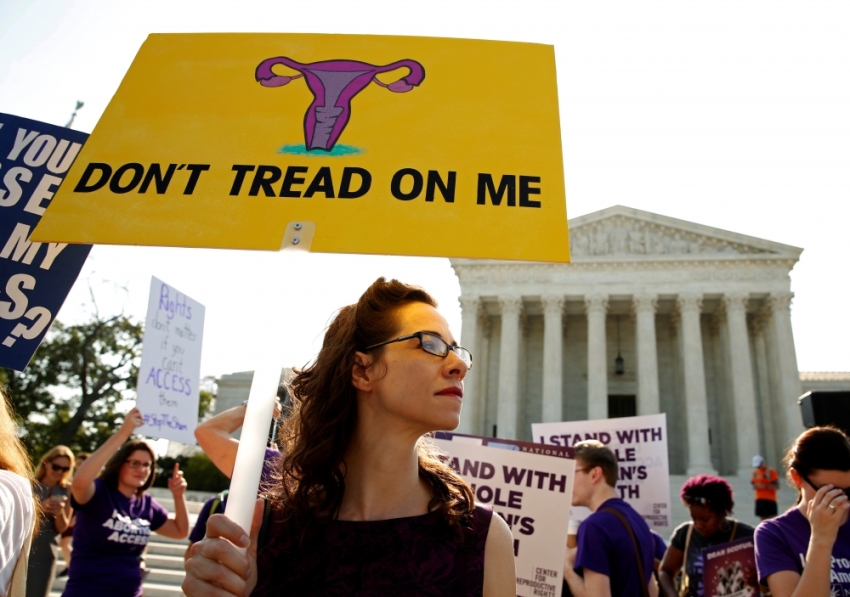Mississippi's 15-week abortion ban is mainstream, most European laws more strict: report

A new report reveals that Mississippi’s 15-week abortion ban, the subject of litigation before the U.S. Supreme Court, is in line with most European laws on abortion.
The Charlotte Lozier Institute, the research arm of the pro-life group Susan B. Anthony List, published a study concluding that “Mississippi’s 15-week Gestational Limit on Abortion is Mainstream Compared to European Abortion Laws.”
Conducted by the Charlotte Lozier Institute associate scholar Angelina Nguyen, the report comes as Supreme Court justices are poised to hear a case involving the law.
After lower courts have ruled in favor of the abortion clinic seeking to invalidate the law, the state of Mississippi, which supports the bill, has asked the Supreme Court to review those decisions. The justices are expected to hear oral arguments in the case of Dobbs vs. Jackson Women’s Health Organization in its upcoming term, scheduled to begin in October, and will make a decision next year.
The report analyzed the abortion laws of 50 European countries, finding that “the majority of European countries that allow elective abortion limit it to 12 weeks.” Specifically, while 42 European countries permit elective abortions, 39 of those nations only allow the procedure to take place when the child is at 15 weeks gestation or less.
A majority of European countries actually have stricter restrictions on abortion than Mississippi’s 15-week abortion ban. Croatia, Portugal, Serbia, Slovenia and Turkey only permit elective abortions within the first 10 weeks of a pregnancy.
Albania, Armenia, Azerbaijan, Belarus, Bosnia and Herzegovina, Bulgaria, Cyprus, Czech Republic, Denmark, Estonia, France, Georgia, Greece, Hungary, Ireland, Kyrgyzstan, Latvia, Lithuania, Montenegro, Moldova, Northern Ireland, North Macedonia, Norway, Russia, Slovakia, Switzerland and Ukraine restrict the procedure to the first 12 weeks.
Austria and Italy only permit elective abortions in the first three months of a pregnancy, while Belgium, Germany, Luxembourg, Romania and Spain have 14-week limits on the procedure.
Only three European countries allow elective abortions to take place more than 15 weeks into a pregnancy: Iceland, the Netherlands and Sweden. The Netherlands has the most permissive abortion law of the three countries, allowing elective abortions to take place as late as 24 weeks into a pregnancy. Iceland and Sweden limit elective abortions at 22 weeks and 18 weeks gestation, respectively.
In contrast to elective abortion, or “abortion without restriction as to reason,” eight European countries require women seeking an abortion to have a specific reason for doing so: Andorra, Finland, Lichtenstein, Malta, Monaco, Poland, San Marino, and Great Britain. Restrictions in these countries range from “most protective of life (to save the life of the mother or completely prohibited) to most permissive of abortion (socioeconomic grounds) with various reasons in between (e.g., physical health, mental health).”
As noted in the report, the “United States Supreme Court precedent allows for elective abortions through all nine months of pregnancy, and only permits states to enact limitations on abortion on demand after viability, a legal definition which has not kept pace with science and is usually marked around 24 weeks.”
In 2017, a Washington Post fact check, citing a previous study from the Charlotte Lozier Institute, confirmed that the United States was one of only seven countries in the world to allow late-term abortions. The others are Canada, China, the Netherlands, North Korea, Singapore and Vietnam.
Nguyen and Charlotte Lozier Institute President Chuck Donovan elaborated on the results of the study and abortion laws in the U.S. in a USA Today op-ed where they said: “We reached this inglorious status by judicial decree, joining only Canada in the dubious distinction of completely sidelining the consent and consensus of the governed.”
As Donovan and Nguyen indicated in their op-ed, the 1973 Supreme Court decision Roe v. Wade and subsequent Supreme Court decisions have determined that women have a right to obtain an abortion throughout the first two trimesters of pregnancy, thereby limiting the ability of states to restrict the procedure. Pro-life activists see the case of Dobbs v. Jackson Women’s Health Organization as an opportunity to reverse the longstanding abortion precedent in the U.S.
When the Supreme Court announced that it would hear the state of Mississippi’s challenge to a Fifth Circuit Court of Appeals decision ruling the state’s 15-week abortion ban unconstitutional, Susan B. Anthony List President Marjorie Dannenfelser praised the development as “a landmark opportunity for the Supreme Court to recognize the right of states to protect unborn children from the horrors of painful late-term abortions.”
Dannenfelser added, “It is time for the Supreme Court to catch up to scientific reality and the resulting consensus of the American people as expressed in elections and policy.”
In addition to pro-life advocates, the attorney general of Mississippi and other pro-life politicians have explicitly called for the Supreme Court to overturn Roe.
In a brief submitted to the Supreme Court last week, Mississippi Attorney General Lynn Fitch argued that Roe and the 1992 case Planned Parenthood v. Casey that upheld Roe’s central finding were “egregiously wrong.” She described the case for overturning the precedent of those two decisions as “overwhelming.”
“Roe and Casey are profoundly unprincipled decisions that have damaged the democratic process, poisoned our national discourse, plagued the law, and harmed the perception of this Court. Retaining those precedents harms this Court’s legitimacy. This Court can thus offer the Nation an overwhelming case for overruling Roe and Casey,” she added.
Fitch also pointed to scientific advancements as another justification for reversing Roe and Casey, specifically highlighting that “advances in ‘neonatal and medical science’ … now show that an unborn child has ‘taken on the human form in all relevant respects’ by 12 weeks’ gestation.”
“And while the Roe Court thought there was no ‘consensus’ among those ‘trained in … medicine’ as to whether ‘life … is persistent throughout pregnancy’ … the Court has since acknowledged that ‘by common understanding and scientific terminology, a fetus is a living organism while within the womb’ before and after viability … Yet Casey and Roe still impede a state from acting on this information by prohibiting pre-viability abortions.”
Sens. Ted Cruz, R-Texas, Josh Hawley, R-Mo., and Mike Lee, R-Utah, filed a separate brief with the Supreme Court, maintaining that “Roe and Casey should be overruled, and the question of abortion legislation should be returned to the states.” If the Supreme Court sides with the state of Mississippi in Dobbs, abortion would not automatically become illegal in all 50 states.
Instead, states like Mississippi would have the ability to limit abortions to the first 15-weeks, while states like New York could continue to enforce permissive abortion laws like the Reproductive Health Act, which allows women to obtain abortions up to the moment of birth.
Ryan Foley is a reporter for The Christian Post. He can be reached at: ryan.foley@christianpost.com



























